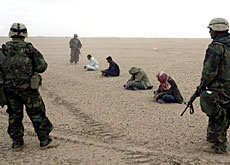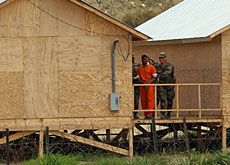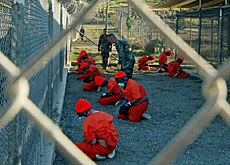ICRC says PoW images breach Geneva Convention

The International Committee of the Red Cross (ICRC) has strongly criticised television footage showing prisoners of war in Iraq.
The humanitarian organisation said the pictures were in violation of the Geneva Conventions, which outline rules of conduct during times of armed conflict.
“It is forbidden to expose prisoners of war to public curiosity… and the essential thing is to make clear to all parties that PoWs should not be exposed in any form,” said Jakob Kellenberger, the Swiss president of the ICRC.
Switzerland is the depository state of the Geneva Conventions, which were established in 1949 to protect and assist the civilian and military victims of conflict.
The document contains 140 articles, which form the backbone of international humanitarian law.
Article 13 specifically refers to the use and distribution of images of PoWs and calls for their protection against “insults and public curiosity”.
Humane treatment
On Sunday, the images of five captured American soldiers were shown on international television screens, sparking public and political outrage, especially in the United States.
The vast majority of American networks refused to broadcast the pictures, although they were widely seen throughout the rest of the world.
United States Defence Secretary, Donald Rumsfeld, slammed the Iraqi authorities for releasing the footage, describing it as “humiliating”, although images of Iraqi PoWs – in the hands of coalition forces – have also been seen in recent days.
“Article 13 is called ‘humane treatment’ and it’s there to protect the dignity of PoWs… and to protect their families against seeing this kind of thing in the media,” ICRC spokesman, Florian Westphal, told swissinfo.
“For the media, this is a moment when they may want to look at their own ethics and their own standards and then take the right decision,” he added.
Unequal interest
After the images were broadcast on Sunday, the ICRC issued a statement calling for all sides to respect the Geneva Conventions.
The neutral organisation has come in for criticism for not issuing a similar declaration when pictures of Iraqi detainees appeared on Saturday.
Westphal rejected accusations of bias on the part of the ICRC, countering that huge media interest had prompted Sunday’s response.
“After the images of the American PoWs were shown on al-Jazeera [an Arab news network], we were flooded with phone calls from the media… whereas on Saturday, when the images were shown of the Iraqi PoWs, we hardly received any calls,” he said.
“I think that may have led to the somewhat misleading impression that the ICRC had a lot to say about one case and not so much about the other,” he added.
Although the ICRC is often asked to comment on political issues, the organisation categorically refuses to take sides and strives to maintain a strictly neutral stance in order to ensure it can work freely during times of conflict.
“We’re not there to assess the behaviour of one side or the other, or to make judgements as to who may be more in the wrong than the other,” said Westphal.
Detainee visits
On Sunday, US officials confirmed that 12 American soldiers had gone missing following an ambush by Iraqi forces on an army supply convoy. They also said that the American military was holding more than 2,000 Iraqi PoWs.
The Geneva Conventions stipulate that detainees must be protected against acts of violence or intimidation, and they empower the ICRC to visit PoWs and monitor their treatment.
But, according to Westphal, the humanitarian organisation has not been given access yet to detainees from either side of the conflict.
“Discussions are underway to be able to attain access as soon as possible… but we accept that this may not happen within the first few days,” he said.
It is essentially up to the warring parties to decide when they will grant access to PoWs, since the Conventions do not give any specific timeframe for visitations. But Westphal is confident it will happen soon.
“We are quite a persistent lot… if we don’t have success with our initial approach, we’ll carry on trying,” he added.
In the meantime, the organisation is also busy concentrating on other areas of the Conventions, which include looking after internally displaced persons and ensuring access to medical treatment, lodging, food and water.
swissinfo, Anna Nelson in Geneva
The International Committee of the Red Cross has criticised the broadcasting of images of American and Iraqi PoWs as a violation of the Geneva Conventions.
Switzerland is the depository state of the Geneva Conventions, which were established in 1949.
They form the backbone of international humanitarian law and contain 140 articles aimed at protecting and assisting the civilian and military victims of conflict.
Article 13 stipulates that PoWs must at all times be humanely treated and that they must be protected, particularly against acts of violence or intimidation and against insults and public curiosity.
The conventions are the bedrock of the ICRC – a neutral humanitarian organisation, which is present in more than 80 countries and employs 12,000 people.

In compliance with the JTI standards
More: SWI swissinfo.ch certified by the Journalism Trust Initiative











You can find an overview of ongoing debates with our journalists here . Please join us!
If you want to start a conversation about a topic raised in this article or want to report factual errors, email us at english@swissinfo.ch.